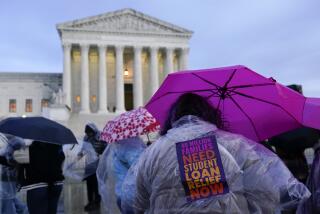‘Costs’ of Combat Linger On, Study Finds : Vietnam Veterans Have Less Money, More Problems Than Others
- Share via
WASHINGTON — Vietnam veterans who were in heavy combat earn $3,000 less annually than Vietnam-era veterans with the same education who served elsewhere, according to a newly released study conducted for the American Legion.
Results of the 1 1/2-year study by Columbia University, announced Tuesday, also showed that combat veterans have a higher divorce rate and suffer more unhappiness than their noncombat counterparts.
“These men appear to be literally paying a financial, as well as emotional, cost . . . for their combat experiences,” the report said.
The study of 6,800 randomly selected veterans--one of the largest made of Vietnam veterans--appears to confirm anecdotal evidence that links a variety of problems to war-time stress, researchers told a news conference.
The earnings gap, for instance, could result from a “spillover of stress effects onto the normal functioning of everyday lives,” including jobs, said Jeanne Stellman, an associate professor at Columbia’s School of Public Health.
Legion Members Surveyed
Stellman noted that all the study’s participants are legionnaires, and said they represent a group that has “resocialized sufficiently” to join an organization and to return survey questionnaires.
The existence of such problems in this group, she speculated, may indicate even worse problems among veterans who do not belong to the American Legion. Thus, she said, the findings represent a “tip of the iceberg, or best-case result.”
Moreover, among black veterans, the income disparities likely are greater than in the study group, she said, noting that only 3% of the group was black. According to the Defense Department, blacks comprised 12.5% of the 2.6 million Americans who served during the Vietnam era--and the percentage of blacks in combat was much higher.
But, Stellman said: “I don’t feel defensive about this being largely a white study because, first of all, that’s what the organization is in terms of the membership--it was not sampled for that reason.”
Household Incomes Compared
Clarence Bacon, the American Legion’s national commander, said his organization is open to all veterans who served in war time. The legion’s membership includes 700,000 Vietnam-era veterans, he said, and added that members are not identified by race.
Of the veterans who who were in heavy combat, 66% have family incomes of $20,000 or more, compared to 74% of those who were in light combat, the study said. Among those who experienced no combat to light combat, 38% earn $30,000 or more, while 28% of the heavy combat veterans have incomes at that level.
Of the heavy combat veterans, 20% have family incomes of less than $14,000, compared to 13% of those who did not experience heavy combat.
Analyzing divorce rates, the researchers confined the study to men now between the ages of 36 and 41. Overall, the study found, 82% of the participants are married, but the percentage drops to 77% among heavy combat veterans. The divorce rate for those who experienced intense fighting is 25%, compared to 12% among those who saw little or no fighting.
As for happiness and general health, the survey--through a series of questions--found that both were “significantly” related to whether the veterans saw heavy combat.
Asked if there is enough information on veterans of other wars to make comparisons or contrasts, Stellman said Vietnam veterans are more willing to talk about psychological feelings regarding war than are previous veterans. He added: “The analogous studies of ‘shell shock’ or the other terms that we used in the previous wars just have simply not been done, and it remains to be seen what the overall cost of heavy combat is for all soldiers.”
In recent years, Vietnam veterans have won increasing acceptance and support from the American public, which largely ignored them immediately after the war. Also, the veterans themselves have grown more assertive about securing social benefits.
Data for Benefits Campaign
John F. Sommer, deputy director of the legion’s National Veterans Affairs and Rehabilitation Commission, said the organization intends to use the study to bolster its efforts to gain more veterans benefits from Congress, the Veterans Administration and other federal agencies.
The earnings gap shows that a number of Vietnam veterans are “unemployed or underemployed,” and his group will advocate job training programs, he said.
The study is the first of several to be released in the coming year. Others will deal with post-traumatic stress disorder, the long-term effects of the herbicide Agent Orange and family reproductive health.
The participants in the study came from legion posts in Colorado, Ohio, Maryland, Pennsylvania, Indiana and Minnesota.
More to Read
Sign up for Essential California
The most important California stories and recommendations in your inbox every morning.
You may occasionally receive promotional content from the Los Angeles Times.












